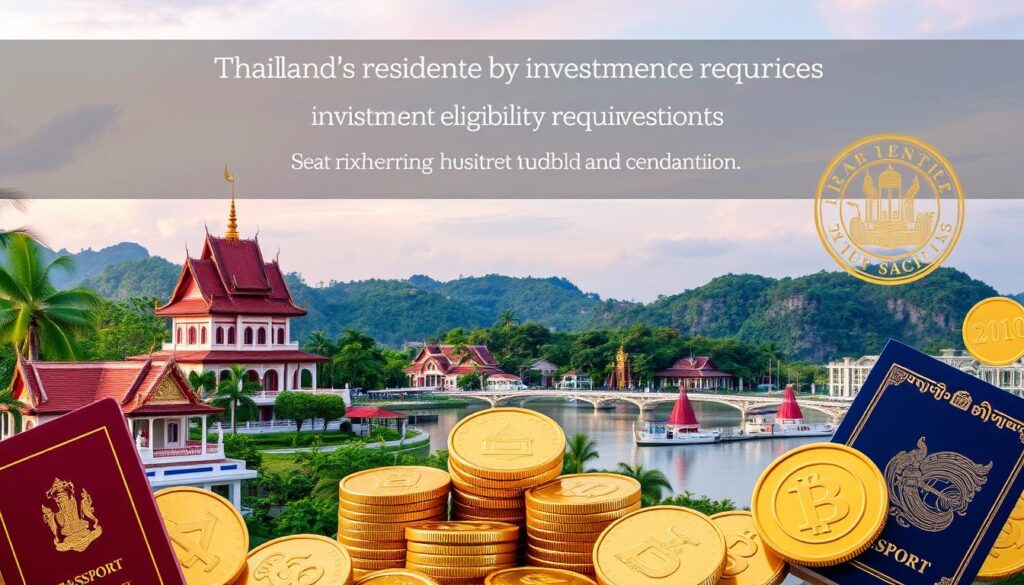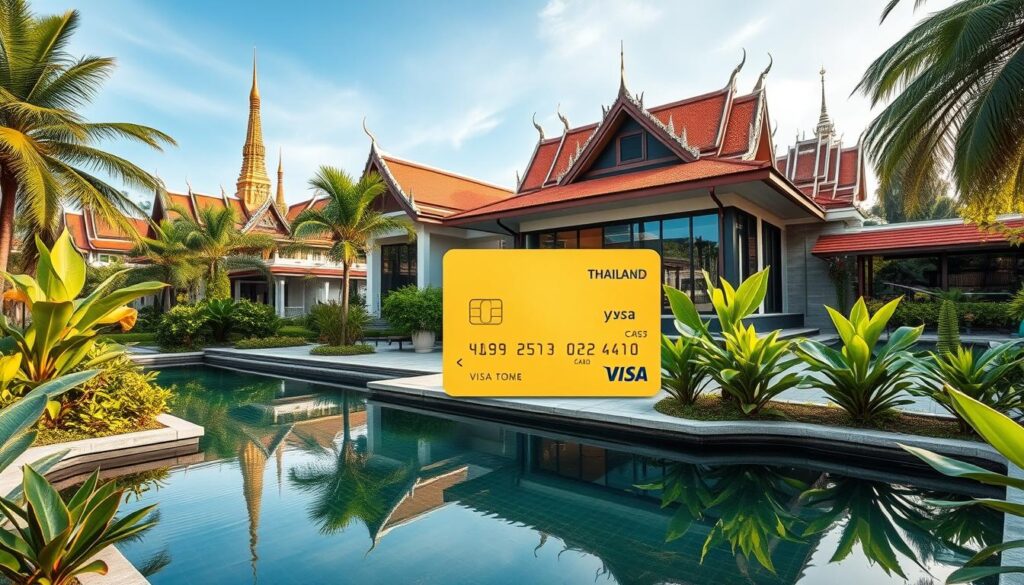Thailand Residence By Investment is an attractive avenue for foreign investors looking to plant roots in one of Asia’s most vibrant economies. With a starting investment of just approximately USD 18,000, candidates can secure up to five years of residency through the Thai Golden Visa program, an enticing option for Thailand investment immigration1. Not only does Thailand boast a strong economic outlook, but it also serves as a strategic gateway to the Asia-Pacific region, providing excellent business opportunities and access to beautiful destinations1. The Thai Residency Program is designed to cater to diverse investment interests, with real estate and business ventures consistently drawing attention from global investors. In this rich landscape, establishing residency opens doors to a high quality of life paired with favorable tax conditions2.
Key Takeaways
- Thailand Residence By Investment offers an accessible pathway for long-term residency in a stable economic environment.
- The Thai Golden Visa requires a minimum investment of only approximately USD 18,000.
- Residency benefits include long-term residency options up to 20 years and VIP services1.
- Foreign investors gain access to beautiful destinations while enjoying a welcoming culture.
- The program complements Thailand’s reputation as a safe haven country in Asia, providing peace of mind2.
Understanding Thailand’s Investment Landscape
The Thailand investment landscape presents a myriad of opportunities, characterized by its strong economic stability and continuous growth potential. With a population nearing 70 million, Thailand boasts a robust consumer market and a thriving economy valued at half a trillion dollars34. The nation’s commitment to economic growth is evident in its Global Innovation Index ranking, where it placed 43 out of 132 countries in 2023, reflecting its advancements in technology and development4.
Economic Stability and Growth Potential
Thailand has demonstrated impressive GDP growth rates, making it one of the most stable economies in Southeast Asia. The country has garnered attention from foreign investors, especially in industries supported by the Board of Investment (BOI) and the Eastern Economic Corridor (EEC)4. The economic landscape also sees considerable contributions from U.S. companies, benefiting significantly from the U.S.-Thai Treaty of Amity and Economic Relations4.
Investment Opportunities in Real Estate
The Thailand real estate investment sector remains particularly promising, offering high returns due to rising demand for rental properties and commercial spaces. Engaging in property ownership can bolster visa applications, particularly with options like the Long-Term Resident Visa or the Thailand Elite Visa. Investors must understand the regulations surrounding property ownership, including the necessity for leasehold agreements or the establishment of a Thai Limited Company to own land indirectly investing in Thailand’s property market aligns investment goals with residency aspirations. Such avenues not only present viable investment opportunities but also cater to diverse investor profiles seeking long-term residency options3.
Benefits of the Thailand Residence By Investment Program
The Thailand Residence By Investment Program presents numerous advantages for individuals looking to gain residency through financial investment. Participants not only benefit from a seamless approach to living in Thailand but also experience the significant advantages of accessing stable economies in one of Asia’s most appealing nations.
Access to One of Asia’s Most Stable Economies
Investing in Thailand allows residents to tap into an economy that boasts robust stability and growth potential. The selection of options within the Thailand Residence By Investment Program includes various packages catering to a range of profiles, allowing for flexibility and tailored solutions. The availability of packages such as the Gold card for 5 years, Platinum card for 10 years, and longer options like the Diamond card for 15 years, and Reserve card for 20 years facilitates long-term planning for expatriates seeking a reliable home base in Asia5.
High Quality of Life
Thailand is not only known for its economic stability but also for its high quality of life. Residents enjoy world-class healthcare, modern infrastructure, and a diverse cultural landscape, making it an attractive location for both living and working. Under the program, applicants can live without the constant worry of visa expiration, thus immersing themselves in the rich experiences Thailand has to offer A peaceful lifestyle and vibrant communities await those who invest the necessary funds to secure their residency. The long-term options available, such as the Wealthy Global Citizen and Wealthy Pensioner categories, contribute to this lifestyle advantage by requiring a minimum annual income of USD 80,000, ensuring that those who relocate have adequate financial resources5.Explore more about Thailand Residence By Investment.

Eligibility Requirements for Thailand Residence By Investment
Investing in Thailand can be a rewarding venture, but it’s essential to understand the eligibility requirements for the Residence By Investment program. Applicants must meet specific criteria revolving around minimum investment thresholds and investment categories. These requirements vary significantly based on the type of investment chosen.
Minimum Investment Thresholds
The program typically necessitates a minimum investment of at least 10 million Baht for those entering under the Investment Category, aimed at fostering positive contributions to the Thai economy6. Additionally, applicants wishing to benefit from other categories, such as Business or Work, may encounter different financial criteria tailored to their situation. For example, Business Category applicants need to show an income of at least 50,000 Baht per month for two years to qualify6.
Categories of Investment Options
Various investment categories exist under the Thailand Residence By Investment program. These include:
- Investment Category: Requires a capital investment of 10 million Baht in real estate, government bonds, or business activities.
- Business Category: Must demonstrate income of at least 50,000 Baht per month for two consecutive years.
- Work Category: Requires holding a work permit for a minimum of three years and meeting specific income benchmarks of at least 80,000 Baht monthly7.
- Humanity Reasons Category: Based on familial connections, it requires proof of financial capability according to established criteria5.
Understanding these investment categories can help potential investors make informed decisions that align with their financial goals and the regulations set by Thai authorities.

How to Apply for the Thai Golden Visa
Applying for Thai Golden Visa opens up a world of opportunities for those seeking long-term residency in Thailand. The application process can seem daunting, yet it’s quite straightforward when broken down into specific steps. Understanding the necessary documentation and legal considerations is vital for a successful application. This section outlines the detailed process and essential paperwork you’ll need to prepare.
Step-by-Step Application Process
The first step in applying for the Thai Golden Visa involves selecting an appropriate membership tier. Options include the Thailand Privilege Gold, Platinum, and Diamond memberships, each offering varying durations and privileges. The Thailand Privilege Gold Membership requires a fee of 900,000 THB, allowing for a 5-year stay with 20 privilege points, while the Platinum Membership costs 1.5 million THB for a 10-year stay and 35 points. Furthermore, the Diamond level involves a fee of 2.5 million THB for a 15-year stay with 55 privilege points, and for an exclusive invitation-only option, the Reserve Membership provides a 20-year stay at a cost of 5 million THB with 120 points8.
After selecting a membership, applicants must pay a fee of 50,000 THB for the required background check, which is essential to ensure that all legal considerations have been satisfied. A decision is usually made within four weeks, although processing may take longer for certain nationalities8.
It is advisable to engage with GSSAs (General Sales and Services Agents), who are authorized consultants. They can offer personalized assistance throughout the application process, ensuring that all documentation aligns with Thai immigration laws.
Documentation and Legal Considerations
The documentation required for applying for the Thai Golden Visa includes a valid passport, completed application forms, proof of funds, and evidence of any previous travel history to Thailand. Additionally, adherence to legal considerations is paramount to avoid any potential issues during processing. Understanding specific legal requirements, such as the necessary assets or income levels, contributes to a smoother application experience. For instance, Wealthy Global Citizens must possess a minimum of USD 1 million in assets, while Wealthy Pensioners need to show an annual income of at least USD 80,000 for the past year9.
With thorough preparation of all these components, applicants significantly increase their chances of a successful application for the Thai Golden Visa, paving the way for an extended stay in one of the most picturesque countries in Asia. For comprehensive details on the application process, consider checking out more information at this source.

Understanding the Thai Residency Program
The Thai residency program offers invaluable opportunities for expatriates seeking to make Thailand their long-term home. Central to this program is the long-term resident visa, designed for foreign nationals who wish to reside in this vibrant country for extended periods. Various options exist within the Thai residency program to cater to different needs and financial capacities.
Long-Term Resident Visa Details
The long-term resident visa is a key feature of the Thai residency program. This type of visa allows individuals to stay in Thailand without the repeated hassle of yearly renewals or reapplications. The Thai Elite Residence Program, for instance, provides multiple tiers of residency, with options that include a ten-year visa for a fee of 1,000,000 THB (approximately $32,500), which also allows the inclusion of dependents for an additional fee of $25,000 each10. The Elite Ultimate Privilege offers a twenty-year visa for a one-time fee of 2,000,000 THB (around $65,000), making long-term living accessible for many11.
Residency Permit Advantages
Holding a residency permit carries numerous advantages that enhance the overall living experience in Thailand. One significant benefit is the ease of navigating real estate purchases, a major draw for many expatriates. With a residency permit, foreigners can confidently enter the property market without the typical restrictions faced by those lacking long-term visas. Additionally, residents can invite their dependents to join them in Thailand, which fosters family unity while enjoying the tranquility and rich cultural experience the country offers12. Furthermore, having a Thai residency opens up exclusive lifestyle services and a supportive community network that can make settling in significantly smoother10.

The Thai Golden Visa: A Closer Look
The Thai Golden Visa, officially known as the Thailand Elite Privilege Visa, offers various benefits tailored for individuals seeking long-term stays in Thailand. This program is particularly appealing to businesspeople, retirees, and digital nomads who want to enjoy a seamless relocation process. Among the primary Golden Visa benefits is the ability to travel freely without the hassle of visa renewals, making it an attractive option for frequent travelers.
Insights on the Golden Visa Benefits
The benefits associated with the Thai Golden Visa are numerous. Members enjoy exclusive services like VIP airport assistance, special travel arrangements, and access to a network of recreational activities. The various membership tiers offer options ranging from five to twenty years of validity, with costs and perks tailored to different needs. For instance, the Thailand Elite Ultimate Privilege Membership costs 2 million THB plus VAT and provides access for twenty years, while the Elite Family Premium Membership is priced at 1 million THB (VAT included) with five years of access for families13. This particular flexibility makes the program highly attractive to those interested in establishing a foothold in Thailand.
Duration and Renewal of Permits
The duration of the Thai Golden Visa can vary based on the membership selected. Most memberships require no additional annual fees, easing the financial commitment for long-term stay. The Elite Privilege Access Membership allows a renewable five-year multiple-entry visa for 1 million THB (VAT included), while the Elite Easy Access Membership costs 600,000 THB (VAT included) for five years13. To maintain eligibility and adhere to visa terms, members must also meet the specific requirements set forth by Thai authorities. While this visa does not directly lead to permanent residency or citizenship, it can serve as a stable bridge to future residency programs such as the Long-Term Resident (LTR) Visa14.

Residency by Investment vs Other Residency Options
Assessing residency by investment options reveals both unique attributes and similarities when compared to other Southeast Asian residency options. In Thailand, individuals can explore programs such as the Elite Visa, which requires significant investment, typically starting at THB 900,000, while the Long-term Resident Visa beckons with a minimum investment of USD 250,00015. Such investment thresholds distinguish Thailand from alternatives in the region.
Comparison with Southeast Asian Countries
Southeast Asian countries offer diverse investment routes for residency. For instance, Cambodia presents a cost-effective pathway with just a business visa costing US$35 and an annual residence permit around US$30016. In contrast, the Thai Elite Visa demands a more substantial financial commitment, reflecting both the country’s economic potential and lifestyle benefits.
Moreover, from an investment perspective, Malaysia’s MM2H program doesn’t provide a citizenship pathway, diverging from options like Thailand’s Long-term Resident Visa, which can facilitate future permanent residency15. The comparative analysis illustrates varying investment landscapes across the region.
Exploring Alternatives: Citizenship by Investment Thailand
Citizenship by investment Thailand represents another compelling avenue. Typically requiring greater financial commitment compared to residency by investment, this route reflects an increasing trend among countries to attract affluent individuals seeking stability and a higher quality of life. This program’s investment amounts can reflect the economic aspirations of the nation and the benefits of integrating into Thai society.
A recent analysis indicates that compared to key programs in Europe, where investment amounts for programs like the Greece Golden Visa begin at EUR 250,000, Thailand’s offerings are similarly positioned17. Insights into these requirements reveal the competitive nature of Thailand’s investment landscape, marking it as a strong contender among Southeast Asian residency options.
Investment Strategies for Foreign Investors in Thailand
Foreign investors in Thailand can implement effective investment strategies to maximize their returns and mitigate risks. With a growing economy and a vibrant market, Thailand provides various avenues for portfolio diversification. Engaging in multiple sectors not only enhances profitability but also stabilizes investment performance amidst market fluctuations.
Diversification of Portfolio in Thai Markets
Portfolio diversification is crucial for reducing volatility and ensuring steady growth. Thailand’s economy, which achieved a GDP of $1.517 trillion by the end of 2023, is the 9th largest in Asia, showcasing a robust investment landscape18. Foreign companies are increasingly recognizing these opportunities, with 317 approvals for investments in the first five months of 2024, leading with Japan at 84 projects18. Many investors are focusing on the Eastern Economic Corridor (EEC), with 99 companies interested in this region, which is projected to become a dynamic financial hub by 203718.
Tax Advantages and Financial Planning
Investing in Thailand offers several tax advantages that can incentivize foreign participation. Wealthy global citizens must demonstrate $80,000 in income over the last two years and possess $1 million in assets to qualify for investment incentives19. Additionally, a 17% fixed income tax rate is available for qualified applicants, providing an appealing fiscal environment19. For pensioners aged 50 and older, a stable annual pension of $40,000 and a $250,000 investment in Thai government bonds or real estate allows access to significant financial benefits19.
| Investment Type | Minimum Investment | Income Requirement | Tax Rate |
|---|---|---|---|
| Global Citizens | $1 million in assets | $80,000 over 2 years | 17% |
| Pensioners (50+) | $250,000 in bonds/real estate | $40,000 annually | 17% |
By thoughtfully considering these investment strategies, foreign investors can successfully navigate Thailand’s market while taking full advantage of the country’s favorable tax regime and growing economic opportunities1819.
Challenges and Considerations for Foreign Investors Thailand
Investing in Thailand, while promising, comes with a variety of challenges for foreign investors. Understanding the legal landscape is crucial for navigating these complexities. Investors often encounter regulations that can be restrictive, particularly surrounding property ownership and business operations.
Legal and Regulatory Landscape
The Foreign Business Act B.E. 2542 (1999) outlines significant restrictions on foreign investors. It delineates over 40 activities where foreign involvement is limited or prohibited, necessitating a foreign business license for participation20. Furthermore, foreign entities often cannot own land outright unless they meet specific conditions, such as securing investment promotion through the Board of Investment (BOI)21. The complexities surrounding employment law also play a role; for instance, while employers can terminate employees, substantial evidence is necessary for terminations with cause, which impacts operational strategies21.
Exit Strategies and Market Risks
When considering exit strategies, investors must be aware of potential market risks. The fluctuating economic climate can impact investment returns, with recent data showing a 31.5% drop in FDI inflows in 2022 compared to the previous year20. Additionally, understanding the implications of market conditions, such as the decrease in stock value in certain sectors, is vital for developing effective exit strategies. Investors may explore options such as selling shares in private limited companies or leveraging strategic partnerships to mitigate risks21.
| Aspect | Details |
|---|---|
| Foreign Business Act | Restricts over 40 business activities20. |
| Property Ownership | Foreigners cannot own land unless meeting specific criteria21. |
| FDI Inflows | 2022 saw a 31.5% decrease in FDI compared to the previous year20. |
| Termination of Employment | Requires evidence for cause-based terminations under Thai labor laws21. |
Conclusion
The Thailand Residence By Investment program offers a unique opportunity for foreign investors to gain stability and enrich their lives in a vibrant economy. With the aim to attract one million affluent or highly skilled foreign residents over the next five years under the Long-Term Resident Visa program, the benefits are numerous. The program not only facilitates a fast-track application process but also grants benefits such as renewable visas and work permissions without the need to hire Thai citizens, reinforcing its appeal22.
Navigating the investment avenues can be complex, yet the guidelines provide a clear road map for potential applicants. With various categories, including Wealthy Global Citizens and Affluent Retirees, there are investment requirements tailored to diverse profiles. Whether it’s a minimum annual income of $80,000 or a targeted deposit in government bonds, these options allow investors to find a suitable entry point22 or23.
The landscape of Thailand’s investment opportunities is rich, marked by favorable conditions for professionals and retirees alike. As you explore this program, it’s essential to consider the challenges alongside the rewarding aspects, which collectively position Thailand as a top contender for anyone seeking a meaningful and prosperous life abroad. For more insights on the latest visa opportunities, check out the detailed information available here, and start your journey towards enriching your personal and financial life.
FAQ
What is the Thailand Residence By Investment program?
The Thailand Residence By Investment program allows foreign investors to establish residency in Thailand by making significant investments, typically in real estate, government bonds, or business activities. This program offers access to one of Asia’s most vibrant economies while enhancing the quality of life in Thailand.
What is the minimum investment required for this residency program?
The minimum investment thresholds vary depending on the chosen investment category, but it usually begins at a substantial amount. It’s crucial for applicants to understand the specific requirements associated with real estate, government bonds, or business investments.
How does the Thai Golden Visa work?
The Thai Golden Visa offers a pathway for foreign nationals to obtain residency through investment. Applicants must complete a structured application process, providing necessary documentation while adhering to legal considerations. The visa provides several advantages such as ease of travel and potential business opportunities.
What are the benefits of living in Thailand under the Residence By Investment program?
Holding residency through the Thailand Residence By Investment program grants access to a high quality of life, featuring world-class healthcare, modern infrastructure, and a welcoming culture. It also allows for business and investment opportunities within a stable economy.
Can I invite my family members to live with me in Thailand?
Yes, residents holding a Thai residency permit can invite dependents, such as spouses and children, to join them in Thailand, making the program suitable for families looking to relocate together.
What are the differences between the Thailand Residence By Investment program and similar programs in Southeast Asia?
While many Southeast Asian countries offer residency by investment, Thailand distinguishes itself with its attractive investment opportunities, particularly in its booming real estate market, and a robust legal framework to support foreign investors.
What tax advantages might I benefit from as a foreign investor in Thailand?
Foreign investors in Thailand may enjoy various tax incentives and exemptions, particularly in real estate investments. Proper financial planning and a diversified investment portfolio can further optimize returns and mitigate risks.
Are there any challenges I should be aware of when investing in Thailand?
Yes, potential challenges include navigating the legal and regulatory landscape which governs property investments and business operations. Foreign investors should be prepared to face various market risks and should consider developing exit strategies to protect their investments.
What options do I have for transitioning to permanent residency or citizenship?
After fulfilling residency requirements through the Thailand Residence By Investment program, investors may be eligible to apply for permanent residency or even citizenship by investment, providing a long-term future in Thailand.
Source Links
- https://imperialcitizenship.com/blog/the-rise-of-residency-by-investment-programs-in-asia/
- https://nomadcapitalist.com/global-citizen/second-passport/4-easy-residence-permits-in-asia/
- https://nomadcapitalist.com/global-citizen/how-to-get-residence-in-thailand/
- https://www.state.gov/reports/2024-investment-climate-statements/thailand/
- https://www.henleyglobal.com/residence-investment/thailand
- https://www.siam-legal.com/thailand-visa/permanent-residence-thailand.php
- https://investmentsforexpats.com/thailand-residency-full-guide-for-expats-2024/
- https://www.thaiembassy.com/thailand-elite-visa/what-is-the-golden-visa-in-thailand
- https://www.siam-legal.com/thailand-visa/long-term-residence-ltr-visa-thailand.php
- https://investmentmigration.org/articles/long-term-residency-in-thailand-understanding-the-thailand-privilege-card-program/
- https://www.goldenvisas.com/thailand
- https://www.investasian.com/property-investment/thailand-residence-visa/
- https://nomadsembassy.com/thailand-golden-visa/
- https://www.siam-legal.com/thailand-visa/ltr-visa-thailand-wealthy-global-citizens.php
- https://immigrantinvest.com/blog/thai-residence-and-citizenship-en/
- https://nomadcapitalist.com/global-citizen/easy-second-residency/
- https://harveylawcorporation.com/residency-by-investment/
- https://thailand.opendevelopmentmekong.net/topics/foreign-direct-investment-in-thailand/
- https://investmentpolicy.unctad.org/investment-policy-monitor/measures/3776/thailand-issues-new-incentives-to-attract-foreign-investors-retirees-and-professionals-
- https://www.celis.institute/celis-blog/foreign-direct-investment-in-thailand/
- https://www.legal500.com/developments/thought-leadership/to-invest-or-not-to-invest-in-thailand-top-3-tips-on-how-to-avoid-legal-problems-when-investing-in-thailand/
- https://www.lexology.com/library/detail.aspx?g=beb30da8-3c8a-429d-b896-2781b10425ea
- https://goodbyematrix.com/emigrate-to-thailand-plan-b/

Comments